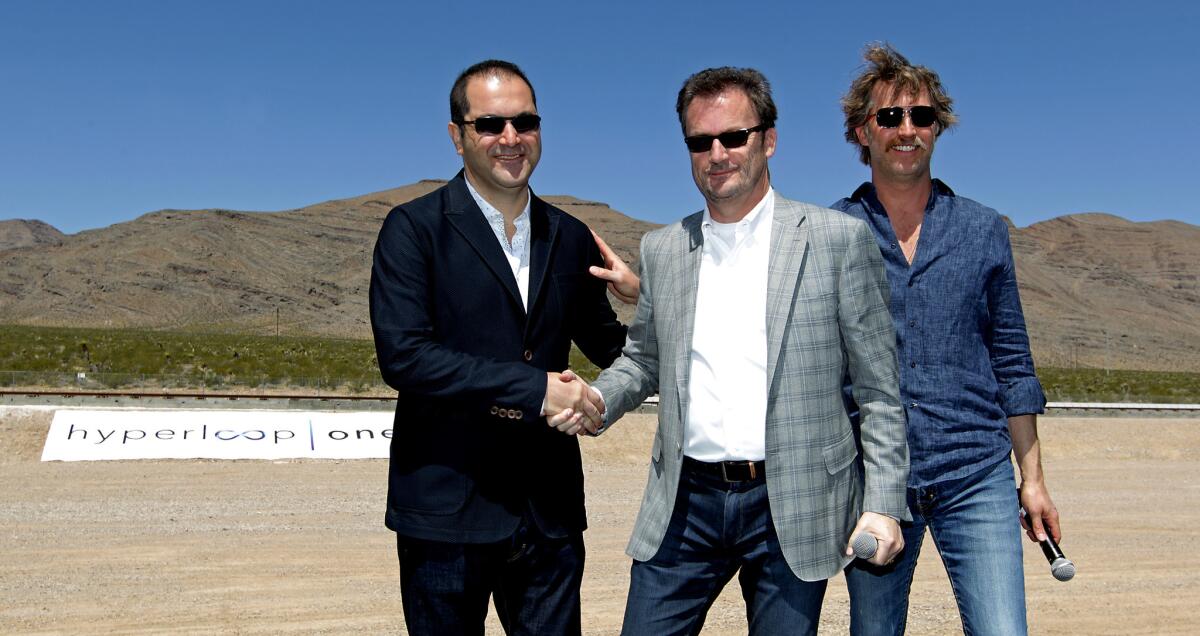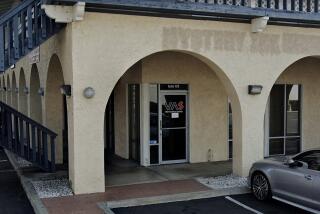Ex-Hyperloop One execs ask if the company’s doing better than ever, why is it suing them?

- Share via
Four former high-ranking employees at transportation start-up Hyperloop One asked a judge Friday to throw out a cross-complaint lodged against them after they questioned the firm’s corporate governance.
The legal battle, which began in July, briefly tripped up the Los Angeles company’s ambitious effort to develop a near-supersonic transit system. The firm says it’s back on track and even stronger, with venture capital investors remaining on board and the suing employees gone.
But in that assertion, attorneys for the the four plaintiffs see a contradiction: If what the company has described as the “Gang of Four” caused no damage, why is the company pursuing a countersuit against them?
“This is the paradox of the company’s predicament: It must reassure investors by claiming the company is thriving and stable, while claiming grave damage was inflicted on the company by the employees,” attorneys wrote in Friday’s filing at Los Angeles County Superior Court.
The former Hyperloop One executives — Brogan BamBrogan, who was chief technology officer; William Mulholland, who was finance vice president; Knut Sauer, who was business development vice president; and David Pendergast, who was assistant general counsel — say that if anything, they left the company in better shape.
The legal battle started after they led a small group of Hyperloop employees who successfully sought corporate restructuring. Eventually, the company heeded their call for investors to cede some power to employees.
In their lawsuit, BamBrogan and the three others said they were concerned by what they called their superiors’ financial mismanagement, including the appearance that family or friends were favored over more qualified candidates in a couple of hiring and contracting decisions.
The week after they filed their suit, the company countersued, seeking $250 million in damages.
The plaintiffs’ attorneys alleged late Friday that Hyperloop One amended its claims last month in an effort to address the apparent inconsistency about the company’s health. The changes, more than a month after its original filing, included a new line saying that the plaintiffs’ “lies and misconduct raised questions from existing investors and partners, causing unnecessary costs and disruptions” to the tune of millions of dollars.
The Times detailed some of the concerns of investors and partners in an article published in between the two filings.
The documents submitted Friday added that the company’s claims about the plaintiffs’ alleged attempt to poach trade secrets, colleagues and investors for a competing venture were not specific enough to merit consideration.
Orin Snyder, an attorney for Hyperloop One, responded Friday night in a statement: “The defendants’ filing ignores the fact that they staged a failed coup and then tried to steal technology to create a competing company. Hyperloop One filed this lawsuit to hold the defendants accountable for their wrongdoing. In the meantime, the company is stronger than ever and on track to launch the world’s first full-scale hyperloop prototype in early 2017.”
A hearing on the dismissal request could come this fall. If it is rejected, the plaintiffs’ attorneys said Friday that Judge Suzanne Bruguera should at least strike several allegedly inaccurate passages in the cross-complaint. Among them is an accusation that the plaintiffs failed to return company property; the four former workers say they have tried to return it but haven’t heard back from Hyperloop One.
How and when the dueling barbs get settled is far from certain. But the case could have lasting effects on how tech start-ups educate early employees about stock options and govern business deals that could be construed as inappropriate, industry experts have said.
The company says BamBrogan and the other three caused significant internal strife during their campaign for changes.
The four say, in turn, that they either were fired or felt pressure to resign. Weeks later, they sued the company to get their jobs back, saying they had been retaliated against for speaking out.
Hyperloop One, formally Hyperloop Technologies Inc., has no commercial projects set for construction. But studies are underway across the world about potential routes for the futuristic system, which Elon Musk, chief executive of both SpaceX and Tesla Motors, introduced to the masses three years ago.
Twitter: @peard33







